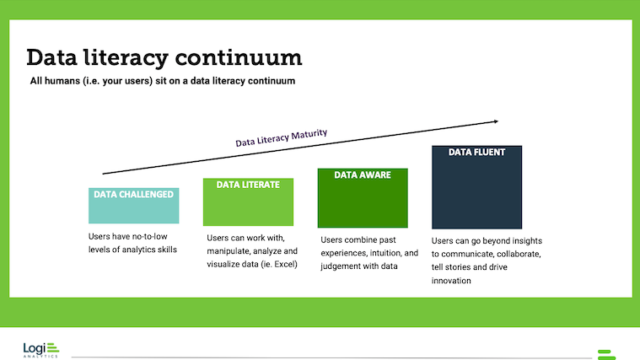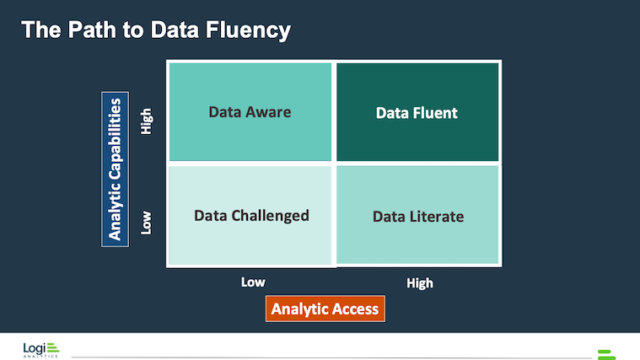What is the data literacy continuum and why does it matter?
Every organization is made up of users with different levels of data literacy and competence.
Most organizations massively overestimate how data literate their people are. In this survey, 84% of businesses think employees have high, or very high levels of data fluency, while only 10% of those users consider themselves data fluent.
All humans – this includes your users – sit on this continuum. Even simple organizations have different data needs.

Understanding where your customers are on the data literacy continuum was the subject of a very lively breakout discussion at BoS Conf Online Fall last month that used a sandwich shop to illustrate what it means and why it matters.
The Data Literacy Continuum and the Sandwich Shop
What do we mean by data fluency and the data literacy continuum? Consider a sandwich shop…
Data Challenged.
- At the bottom, we have the data challenged. These users have no to low analytic skills or are not using the skills they have in the context in which the data is presented.
- These people need the most hand holding and assistance in making data driven decisions, they will essentially need a tool to make all the analysis for them and showcase the decision. This group needs invisible analytics.
- Customers typically want their lunch as quickly as possible. When an item has sold out, it makes sense to take it off the electronic menu board or mark it as sold out. It improves customer experience and time if they don’t have to reconsider their order at the point of purchase.
Data Literate.
- People who can manipulate, analyze and visualize data. A good chunk of people sit at this level of data literacy.
- At this level someone might be able to load a spreadsheet with a lunch order and use the data to tell them how many sandwiches and how many chips or crisps you need to fulfill a group order sent through in advance.
Data Aware.
- Users who can combine past experiences, intuition and judgment with data.
- Building on the previous example, the data aware person looks at the spreadsheet of sandwiches and chips and or crisps, and thinks, last time, the person who came to pick up the group order also came with orders from about 10% more people who didn’t pre-order. So, let’s go ahead and prepare extra sandwiches. This goes a step beyond just looking at the data in your spreadsheet and using past experiences to aid in your data driven decision making.
Data Fluent.
- The users who go beyond insights to communicate, collaborate, tell stories and drive innovation. They can read the data, they can think of a creative way to solve problems. This is the person who might say “Hmm, we’re making 100 individual sandwiches regularly for that group and when it’s picked up, they always slow everything down for all our customers as there are always last minute additions. Can we deliver that order before the lunchtime rush to reduce the lunchtime bottleneck and encourage everyone to preorder? They may update their electronic menu board to indicate scarcity (3 of today’s special left), or reduce wait time (5 minute wait for cappuccino).
- The sandwich shop example is pretty simple but is a snapshot of the types of users and levels of understanding that exist in most organizations.
Where are Your Users on the Data Literacy Continuum?
Understanding where your partner organizations sit on the data literacy continuum helps you both serve them better and develop the overall data awareness and literacy.

By delivering the right data to the right people across an organization, you create a virtuous circle in which less data literate users become more comfortable with the applications you are delivering which gives them the confidence and knowledge to become more data literate while more advanced users are able to make more use of the data you can deliver.
More on why understanding the data literacy of your customers matters and what to do about it.
To learn more about the state of data literacy today and how analytics are the key to transforming modern businesses, read further:
- 2021 State of Analytics: Why Users Demand Better
- 2021 State of Analytics: How Data Literacy Improves Decision Making
- Reaching Data Fluency: Finding the Right Path for Your Organization
- The Big Payoff of Application Analytics
Learn how great SaaS & software companies are run
We produce exceptional conferences & content that will help you build better products & companies.
Join our friendly list for event updates, ideas & inspiration.